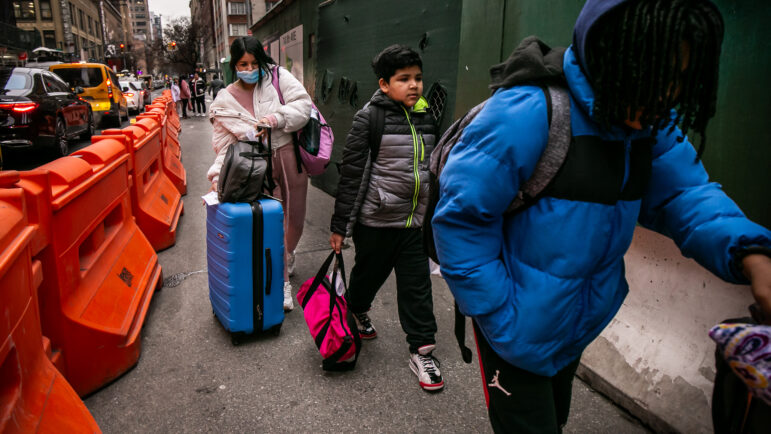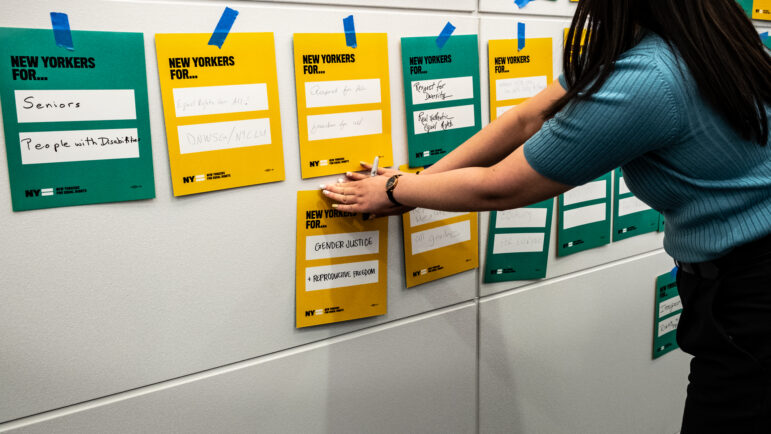One night, while Barbara was asleep in her New York City apartment, her girlfriend attacked her, stabbing her in the forehead. She survived the attack with 50 stitches, but that was just the beginning of her ordeal. For Barbara, a lesbian, the battered women’s shelter she fled to wasn’t much of a respite.
She was sent to an out-of-state women’s shelter where the staff instructed her not to tell the other residents that her attacker was a woman. They also made derogatory comments about lesbians, breaking their promise of confidentiality and telling other shelter residents she was gay. Then they failed to protect her when she was insulted and humiliated by the other women.
Luckily, Barbara was transferred back to Brooklyn to a shelter that specializes in helping battered lesbians. There she got counseling, sympathy and help in finding safe permanent housing.
The women’s shelter that Barbara went to is run by the Park Slope Safe Homes Project, a 22-year-old battered women’s program that started with a small group of women offering spare bedrooms to other women running from their abusive husbands. It has since evolved into a $700,000-a-year nonprofit with 13 staff members, a hotline and two small shelters.
And as the demographics of the women in southern Brooklyn have changed, the organization adapted to fit. “In the beginning Safe Homes primarily served middle-class white women,” says executive director Cynthia Dansby. “Now we get women from all over the city. We are seeing younger women who’ve had their children young. We’ve had women who’ve been on the streets.”
The lesbian project that helped Barbara started up in the early 1990s, and Safe Homes has since begun a specialty program for another new Brooklyn community: immigrant Arab women. The two populations are very different, but both run into trouble in the battered women’s social services system. For lesbians, domestic violence is still a taboo subject. They have problems getting their legal rights recognized, and the police and shelter system are unresponsive, even hostile. For Arab women, there is intense cultural isolation, a lack of Arabic-speaking social service workers and discrimination.
Recognizing that a one-size-fits-all attitude no longer works for domestic violence prevention and counseling, the Safe Homes Project developed programs that are specially suited to the changing needs of Brooklyn women. And as the women who staff these programs have discovered, it takes a particular mix of compassion and pragmatism to get these women the help they need.
_______
Lesbians often have a difficult time in social services and legal systems that are designed for heterosexual couples, says Safe Homes staffer Judy Yu, a young, politically active lesbian. Cops, judges and social workers are often unsympathetic or even downright rude.
“One of our clients was applying for welfare,” remembers Yu. “The social worker said ‘You let yourself get beaten up by a woman?’ and started laughing.”
Yu says that police officers can be especially difficult. “Police often don’t follow domestic violence procedures when it involves two women,” she says. “Some cops think it is funny–it’s a ‘cat fight.'” Or worse, they will misjudge the situation and charge the wrong woman. “They go by stereotypes,” she says. “They think the butch is always the abuser.”
But police help is key. A woman with an abusive husband can quickly get an order of protection through Family Court, which does not require criminal charges against the abuser. Since New York City’s domestic partnership program has no legal standing in Family Court, only lesbian couples that have legally adopted each other’s children have access. For other lesbians, the order must be obtained through criminal court, meaning that a criminal case must be initiated against the ex-lover, says Nadya Rosen, a caseworker with Safe Homes’ Lesbian/Bi/Trans Women’s Project. For a victim to get an order of protection, the batterer must commit an arrestable offense in the eyes of the law.
In Barbara’s case, even the criminal courts were of little help. Though charged with attempted murder and convicted of assault, Barbara’s ex-girlfriend was sentenced to only one day in jail. Barbara’s advocates say the judge was somewhat sympathetic to the older woman and was unwilling to give her a long jail term.
“There is a sense that women do not believe women can be as violent as men,” Rosen says. According to the Federal Bureau of Investigation, one in four heterosexual couples have abusive relationships. The Gay and Lesbian Anti-Violence Project (AVP) finds that gay couples aren’t much different: They estimate one in five homosexual relationships is abusive.
As with straight couples, domestic violence takes many forms: beatings, insults, rape, tyrannical jealousy. But gay couples are also vulnerable in more public ways. “For a lesbian, domestic violence can take the form of forced ‘outing’ by her partner,” explains Diane Dolan-Soto, domestic violence program coordinator for the AVP. “If a woman is outed as a lesbian, she may lose her job or other necessary supports. If she is a mother, disclosing that she is a lesbian may mean risking the loss of her children.”
Most traumatic of all, a lesbian victim of domestic violence who charges her partner with abuse may be accused of being a traitor to feminism or lesbianism. “There is definitely an element of not wanting to bring more stigma on our community,” says Rosen. “By naming the violence, we are seen as reinforcing the stereotypes against ‘out’ women.”
“A lot of us in the queer community are feminist,” she adds. “It is hard, when you are political, to see your friend as a potential batterer. This traps women who are abused, when their community says they are lying.”
To bring attention to the domestic violence problem in lesbian relationships, the Safe Homes staff and volunteers hold sensitivity trainings for other shelters throughout the city. They post fliers in popular women’s hangouts in Brooklyn and Manhattan, and run a support group for lesbian, bisexual and transgender survivors of domestic violence–the only one of its kind in Brooklyn.
_______
The experience that Safe Homes counselors had working with the close-knit lesbian community helped prepare them to begin work with some of Brooklyn’s newest immigrants, Arabic-speaking women from North Africa and the Middle East. Some of the same issues–cultural isolation and insularity–are common to both groups, but Arab women have an additional difficulty: finding social workers that speak their language and understand the rules of Middle Eastern Islamic culture.
Safe Homes hired Jacqueline Jaber last year to work with women in Brooklyn’s growing Arab communities in Bay Ridge, Sunset Park and Park Slope, a population now topping 100,000 people. With just word of mouth and no advertising, Jaber’s women now make up 8 percent of the 740 clients Safe Homes sees each year. Jaber, who speaks Arabic, works with a core group of 30 women, running support groups and translating for her clients as they try to work their way through the city bureaucracy.
Jaber, a gregarious Palestinian American with a hearty laugh, was raised in Brooklyn in a very religious Muslim family. “I was the eldest of 10 children and my mother was often sick,” she says. “I grew up taking care of people.” Jaber herself was in an arranged marriage that produced four children; she is now divorced.
Most of the women Jaber works with–including Palestinians, Moroccans, and Syrians–come from very traditional Muslim families. Some wear shara’a, the full-length gown and head scarf. Jaber must be able to negotiate dozens of different variations on nationality, class and cultural upbringing. “The Syrian women tend to be more educated,” she says. “The Yemeni women often come from small villages and may speak only a local dialect of Arabic.”
One of only two Arabic-speaking domestic violence counselors in New York City, Jaber is busy. “There are no city services for Arabic speakers,” she says. So she also gets calls from non-Muslim Arab women, and has even helped the American-born wives of Middle Eastern men. “The problems with Arab men are the same [when they have] American wives–there is physical and economic abuse. They are controlling.”
Jaber explains that her job isn’t to change the women that come to her support group, but rather to provide them with options. “Many of these women do not see verbal abuse as abuse,” she says. “I give them other points of view.” She exposes her clients to liberal interpretations of the Koran, discussing their religion and how they view the violence in their lives. They must understand, Jaber says, “the Koran does not justify domestic violence.”
For many of Jaber’s clients, the biggest problem is that they don’t know how to use New York City’s support systems, which are nothing like the traditional ones they know from home. “If there is domestic violence in their native country, men from both families will meet with the local sheik to resolve the issue,” she explains. “They do not have that support here.” Much of Jaber’s time is spent waiting in offices to translate for her clients, weathering impatient and harsh comments from caseworkers.
“The public assistance people ask why my clients dress in shara’a, why they have so many kids,” she reports. “These are things they would never ask a black or Latino woman.” Jaber says she has to answer even stupid questions politely to get the job done. “They ask me what I think about Iraq, or ‘When you say Palestine, don’t you mean Israel?’ I don’t have time to educate them. I have to get on to the next task.”
One of her clients, Fatima, is a 33-year-old Palestinian woman with six children who now lives in Sunset Park. She had her first kid at age 15, and came to New York City at age 19. But her relationship with her husband, a store clerk, deteriorated after four or five years in New York. Soon, he abandoned the family, coming back regularly to beat up and yell at his wife. “I felt I had no options,” Fatima says through a translator. “In our culture, you listen to your husband.”
Jaber got Fatima the order of protection that keeps her violent husband away-Jaber reports that enlisting the cops is often very helpful, in part because many Arab men may be afraid of deportation. Jaber also suggests another reason: “Because they were raised under repressive regimes, they listen to men in uniform,” she says with a chuckle.
She got Fatima on welfare, and Safe Homes is finding her a new apartment. “God willing, when the housing comes through, I will study English and, of course, get a job,” says Fatima.
“Because I had no chance to be educated, I hope one of my children will go on to higher education,” she says. “I hope my daughters will have good reputations.”
Both Yu and Jaber admit that dealing with the complexity of these particular brands of domestic violence is difficult, even exhausting. But both also report that the work can be rewarding, partly because they can see concrete results in women’s lives. “I am proud of the work I do,” says the pragmatic Jaber. “I am helping my community.”
“We’ve painted a pretty dark picture of queer women being battered,” admits Yu. “But they do survive. It is a testament to their strength.”
Dylan Foley is a frequent contributor to City Limits.








